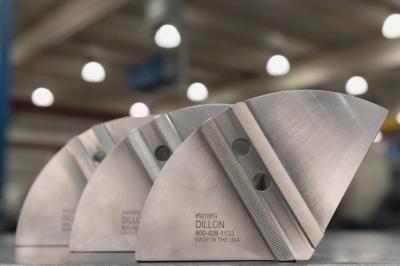
Dillon full grip jaws are manufactured from 6061 extruded aluminum bar stock which eliminates the porosity inherent with castings, thus increasing their strength and reliability. Now available up to 28-inches in diameter, they can be modified to heights of 10” and widths that exceed the chuck face diameter for increased capacity. Maximum contact area from the full grip jaws provides a solid gripping surface which yields more friction for drive with reduced part distortion. They are ideal for high-speed machining, as well as precision boring, tapping, drilling, and finishing across virtually all industrial markets.
In addition to 6061 extruded aluminum, Dillon Full Grip Pie Jaws are available in brass, 1018 steel, and cast iron. Custom designs available with special heights, diameters, and configurations, including a matching serration location which is exactly perpendicular to the slots.
Dillon Chuck Jaws can provide both standard and special pie jaws in 1.5mm x 60°, 3.0mm x 60°, 1/16th x 90°, and 3/32 x90° serrations, American standard and metric tongue and groove, and acme and square serrated key type mounting interfaces.
Dillon chuck jaw products are manufactured in ISO 9000-2015 registered facilities with industry-leading lead times, typically 2 weeks or less.
Contact Details
Related Glossary Terms
- boring
boring
Enlarging a hole that already has been drilled or cored. Generally, it is an operation of truing the previously drilled hole with a single-point, lathe-type tool. Boring is essentially internal turning, in that usually a single-point cutting tool forms the internal shape. Some tools are available with two cutting edges to balance cutting forces.
- chuck
chuck
Workholding device that affixes to a mill, lathe or drill-press spindle. It holds a tool or workpiece by one end, allowing it to be rotated. May also be fitted to the machine table to hold a workpiece. Two or more adjustable jaws actually hold the tool or part. May be actuated manually, pneumatically, hydraulically or electrically. See collet.
- tapping
tapping
Machining operation in which a tap, with teeth on its periphery, cuts internal threads in a predrilled hole having a smaller diameter than the tap diameter. Threads are formed by a combined rotary and axial-relative motion between tap and workpiece. See tap.







